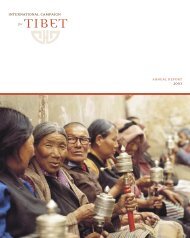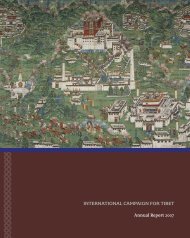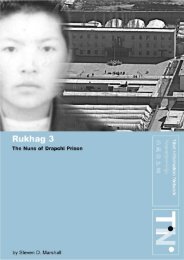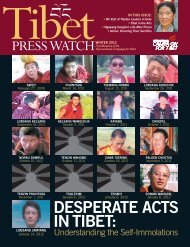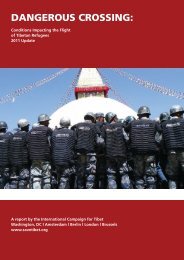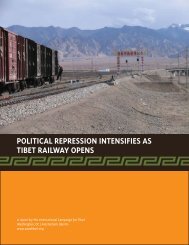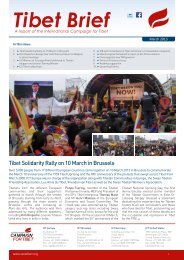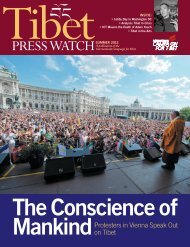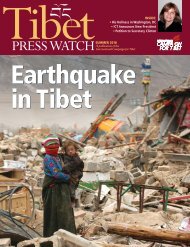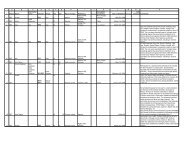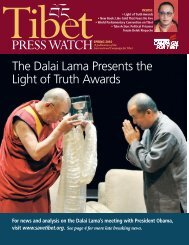download the report - International Campaign for Tibet
download the report - International Campaign for Tibet
download the report - International Campaign for Tibet
Create successful ePaper yourself
Turn your PDF publications into a flip-book with our unique Google optimized e-Paper software.
INTERNATIONAL CAMPAIGN FOR TIBET<br />
The 1989 crackdown in <strong>Tibet</strong>, overseen by Hu, and which<br />
led to <strong>the</strong> imprisonment and torture of thousands of<br />
<strong>Tibet</strong>ans following pro-independence protests, brought an<br />
abrupt end to a period of relative political liberalization.<br />
It also set <strong>the</strong> tone <strong>for</strong> <strong>the</strong> ensuing years of political tension,<br />
as well as bringing Hu himself to prominence within <strong>the</strong><br />
Party and government.<br />
Hu Jintao was among a core of senior Chinese leaders who<br />
met in Beijing in July 1994 at <strong>the</strong> “Third Work Forum” on<br />
<strong>Tibet</strong> to devise policies aimed at rapid economic development<br />
in <strong>Tibet</strong> while attempting to undermine loyalty to <strong>the</strong><br />
President Hu Jintao<br />
Dalai Lama; and as Vice President in July 2001, he participated in <strong>the</strong> “Fourth Work<br />
Forum”, where similar policies were consolidated under <strong>the</strong> imperative to “vigorously<br />
lead <strong>Tibet</strong>an Buddhism to adapt to socialism”.<br />
Under Hu, <strong>the</strong>re emerged a set of policies in <strong>Tibet</strong> which developed into a political<br />
order, which <strong>the</strong>n became institutionalized by <strong>the</strong> Third Work Forum. Hu’s most<br />
striking impact upon <strong>Tibet</strong> was to provide <strong>the</strong> policy means which grant <strong>the</strong> Chinese<br />
authorities in <strong>Tibet</strong> <strong>the</strong> ‘right’ to intrude into every single aspect of people’s lives;<br />
whereas previously, <strong>the</strong> state acted upon <strong>the</strong> perceived threat of <strong>Tibet</strong>an nationalism<br />
in <strong>Tibet</strong>’s monasteries and nunneries, Hu’s legacy has been to open <strong>the</strong> <strong>Tibet</strong>an people’s<br />
schools, work-places, religious institutions, and even <strong>the</strong>ir homes to <strong>the</strong> same<br />
kind and degree of political scrutiny.<br />
An even more aggressive campaign of denunciation of <strong>the</strong> Dalai Lama was also initiated<br />
at <strong>the</strong> Third Work Forum. The apparent <strong>for</strong>malization of <strong>the</strong> campaign to<br />
denounce <strong>the</strong> Dalai Lama was yet more indication that under <strong>the</strong> influence of Hu Jintao,<br />
<strong>the</strong> Chinese authorities were rapidly backing away from <strong>the</strong> relatively liberal<br />
policies on <strong>Tibet</strong> which had first emerged under Party General Secretary Hu Yaobang:<br />
<strong>the</strong> meeting to draft documents emerging from <strong>the</strong> Third Work Forum was chaired by<br />
Hu Jintao. 1<br />
Since becoming president in 2003, President Hu has personally appointed many of<br />
<strong>the</strong> senior regional leaders in <strong>the</strong> various provincial-level administrations into which<br />
<strong>Tibet</strong> is now incorporated, including many from his own personal power base in <strong>the</strong><br />
CCP, <strong>the</strong> Communist Youth League of China (CYLC).<br />
Among <strong>the</strong>se people appointed by Hu are <strong>the</strong> Party Secretary of <strong>the</strong> TAR, Zhang Qingli<br />
95



